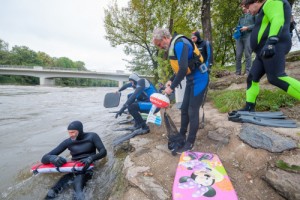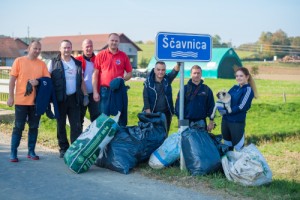In July 2017, the Slovenian government adopted an amendment to the regulation on the handling of packaging and packaging waste, in order to permanently reduce the use of light plastic bags. As of 1 January 2019, free-of-charge plastic bags would be banned at all sales outlets in Slovenia. This was a challenge for business owners who would have to adapt to the new legislation and start charging for plastic bags. To help our client, convenience store chain SPAR Slovenia, we designed a communication program responding to the following challenges:
- Show the efforts of SPAR Slovenia as an ecologically aware retail dealer.
- Inform consumers that plastic bags will no longer be free of charge as of 1 January 2019 and offer them an alternative (sustainably produced, reusable bags).
- Inform consumers about the importance of using recycled materials and reducing plastic pollution in the environment.
Based on research of SPAR Slovenia's existing socially responsible campaigns and those of other retailers, and after researching the consumption of plastic bags in Slovenia, we identified the following factors that would influence the communication program and sustainability activities:
- According to the estimates of the European Commission, the average inhabitant of Slovenia uses more than 500 plastic bags per year, or more than 40 per month, many of which end up in waterways and landfills. (In 2015, volunteers with Ecologists Without Borders registered more than 13,000 unofficial dumps in Slovenia.)
- In 2017, the right to drinking water was entered into the Constitution of the Republic of Slovenia. Slovenia's commitment to clean water was an opportunity to get a positive public response.
- SPAR Slovenia regularly carries out other socially responsible campaigns, although not usually related to environmental issues.
The key stakeholders in the project were divided into two groups: Unaware consumers who don't yet relate to sustainability issues like the use of plastic bags. The sudden requirement to pay for plastic bags could leave them confused and dissatisfied. Communication to this group would raise the awareness that plastic bags don't need to be bought, because the customers can always shop with a sustainable bag and contribute to a good cause by buying one. Ecologically aware consumers who already show an interest in environmental issues. A river cleanup campaign, "Let's Clean the Rivers," would be an additional incentive for them to buy and use a sustainable bag in the "Think Ecologically" campaign. We focused on a relatively broad population for the campaign, because we were addressing all the customers coming to SPAR Slovenia where plastic bags were free of charge until 2019. Therefore, the key stakeholders are also those who don't always shop at SPAR. Through communication activities, we also planed to attract the latter to go to SPAR Slovenia. The goal of our communication activities was to encourage users to buy sustainable, reusable bags, to consequently raise funds for cleanup projects on two two rivers in north-eastern Slovenia, and to introduce customers to the habit of using the sustainable bags.
The solution
In order to limit the use of plastic bags, we designed the "Think Ecologically" campaign, Within the communication plan, we defined the following communication objectives:
- At least 30,000 consumers will purchase a sustainable "Think Ecologically" bag through communication activities in the first two months of the campaign, and raise 3,000 for cleanup projects on two rivers.
- Implement communication activities to gain at least 10 neutral or positive pieces of media coverage (television/radio/print/web) about the socially responsible campaign in the month after the cleanup of each individual river.
 SPAR started to offer a sustainable shopping bags made from environmentally friendly, 100% recyclates. From the purchase of each bag, the company donated 0.1 to a social responsibility campaign. To increase customer awareness, we used social networks to invite users to create their own eco-shopping bag on the web, allowing them to participate in the campaign and vote on options. The communication strategy included proactive communication of SPAR Slovenia's social responsibility efforts and the solution that the company would offer to all customers when the legislation took effect at the beginning of 2019. In communication, we focused on appearing in traditional and converged media, and prepared video and image content for use on social networks. We ensured the visibility of the campaign by cooperating with certain associations that participated in the cleanup projects (such as diving associations and the Water Protection Society), who shared the content among their members and the external public. The key message of "SPAR Slovenia wants to clean up Slovenian rivers with the proceeds of selling the recycled shopping bags" campaign aimed to make the river cleanup campaign a traditional activity for SPAR Slovenia.
SPAR started to offer a sustainable shopping bags made from environmentally friendly, 100% recyclates. From the purchase of each bag, the company donated 0.1 to a social responsibility campaign. To increase customer awareness, we used social networks to invite users to create their own eco-shopping bag on the web, allowing them to participate in the campaign and vote on options. The communication strategy included proactive communication of SPAR Slovenia's social responsibility efforts and the solution that the company would offer to all customers when the legislation took effect at the beginning of 2019. In communication, we focused on appearing in traditional and converged media, and prepared video and image content for use on social networks. We ensured the visibility of the campaign by cooperating with certain associations that participated in the cleanup projects (such as diving associations and the Water Protection Society), who shared the content among their members and the external public. The key message of "SPAR Slovenia wants to clean up Slovenian rivers with the proceeds of selling the recycled shopping bags" campaign aimed to make the river cleanup campaign a traditional activity for SPAR Slovenia.  In cooperation with the Slovenian Diving Association (SPZ), we chose two locations for "Let's Clean the Rivers" projects. We chose the rivers and their surroundings based on the level of pollution. The most polluted rivers in Slovenia are the Sava, Ljubljanica, Voglajna, Scavnica and Lendava. The most polluted are Sava and Drava, mainly due to industry, and Mura due to agriculture. In autumn of 2017, we witnessed flooding in the north-eastern part of the country due to heavy rainfall. The biggest threat were the rivers in Pomurje region and that was the reason for choosing the Mura and the Scavnica to be cleaned up, while we also announced in the SPAR flyers that in spring 2018, we would continue the campaign with cleaning the Sava and Ljubljanica rivers. Our activities in the "Think Ecologically" campaign included:
In cooperation with the Slovenian Diving Association (SPZ), we chose two locations for "Let's Clean the Rivers" projects. We chose the rivers and their surroundings based on the level of pollution. The most polluted rivers in Slovenia are the Sava, Ljubljanica, Voglajna, Scavnica and Lendava. The most polluted are Sava and Drava, mainly due to industry, and Mura due to agriculture. In autumn of 2017, we witnessed flooding in the north-eastern part of the country due to heavy rainfall. The biggest threat were the rivers in Pomurje region and that was the reason for choosing the Mura and the Scavnica to be cleaned up, while we also announced in the SPAR flyers that in spring 2018, we would continue the campaign with cleaning the Sava and Ljubljanica rivers. Our activities in the "Think Ecologically" campaign included:
- Designing and making sustainable recyclable bags.
- Organizing the cleanup of the Mura and Scavnica rivers in cooperation with the Slovenian Diving Association. In September 2017, Mura was cleaned by the Diving Society of Murska Sobota and in October 2017, Scavnica was cleaned by the Diving Society of Gornja Radgona. The Slovene Diving Association posted an invitation and a report about the both cleaning actions on its website and Facebook page, as did the participating diving societies.
We previously registered each cleanup project on on the Mojareka.si portal, which brings together the waterway cleanup campaigns in Slovenia. During each cleanup, we made a video that included statements of the participants to include in a press release and share on SPAR Slovenia's social networks profiles.
Since the cleanups took place in north-eastern Slovenia, we invited the local media and local public, while sending an announcement to the national media. The main challenge in organizing the cleanup of the Mura was bad weather conditions and floods, which discouraged some of the volunteers from participating. Nevertheless, the action was carried out with a sufficient number of participants. Before cleaning the Scavnica, we connected with the Slovenian Water Protection Society, which shared the information about the cleanup on its website and social networks profiles, and informed its members about the campaign by sending internal email.
The results
Objective
At least 30,000 consumers purchase a sustainable "Think Ecologically" bag with a set of communication activities in the first two months of the campaign, and raise 3,000 for cleaning up two rivers.
Result A total of 32,051 consumers participated in a prize game and contributed by purchasing a bag. In two months, 3,205.10 was raised for the river cleanup projects.
Objective Implement communication activities to gain at least 10 neutral or positive pieces of media coverage (television/radio/print/web) about each cleaning action.
Result We gained 13 neutral and positive pieces of media coverage about cleaning up the Mura and 15 neutral and positive coverage pieces about cleaning the Scavnica.